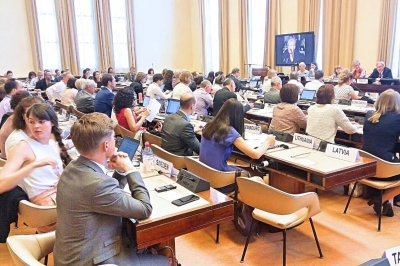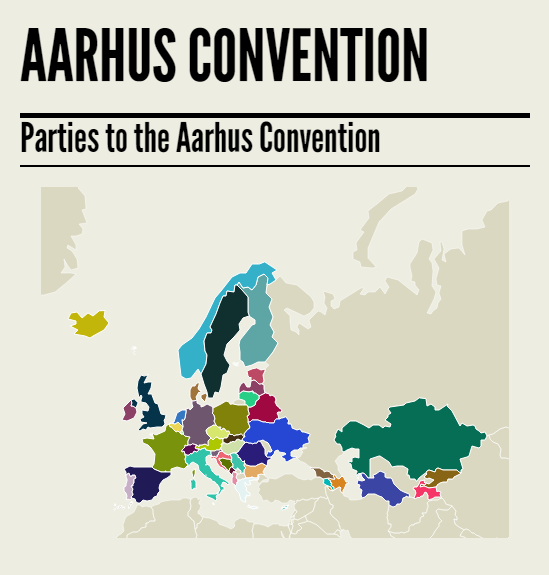Though the anniversary itself takes place on June 25, the ceremony is held today at a meeting of the signatory countries at the UN Center in Geneva.
Aarhus Convention is primarily important for countries with long-lasting problems in protecting human rights and enforceability of the law. The governments are required to submit regular reports in compliance with the Aarhus Convention. Also, people can submit complaints to the compliance committee. To date, it has dealt with almost 50 cases; some of them have helped promote better law enforcement in countries.
Stop the Persecution
“Environmental activists are increasingly targeting repressive measures and retaliatory actions. It is crucial that people exercise their environmental rights free from fear,” states UNECE's official announcement of the ceremony.
The persecution of environmental activists was also one of the topics of the last meeting in November 2017 in Budva, Montenegro. The particular cases of oppression are monitored by the Czech organization Arnika and the cases published on-line at stop-persecution.org .
"The Aarhus Convention is crucial for many countries that lack appropriate protection of related civic rights. This is not only the case in Eastern Europe or the Balkans," Arnika's chairman Martin Skalsky explains.
The UNECE Convention on Access to Information was published on June 25, 1998 in the city of Aarhus, Denmark, and entered into force three years later. To date, 46 states in the European Union have signed the document. Only Liechtenstein and Monaco have not yet ratified the agreement.
UNECE press release on the 20th anniversary of Aarhus Convention
List of the countries under the Aarhus Convention
Map of the countries under the Aarhus Convention
Aarhus Convention compliance in some countries
Ukraine - Even though there were successful steps towards environmental democracy, Ukraine has a lot to do. Its citizens can not find almost any information in on-line databases, and they still have to file an official written request to the authorities. In many cases, it is difficult to learn about the decision-making process being launched.
One of the brighter cases was the complaint of the Society and Environment , and a non-governmental organization that has been successful in improving environmental impact assessment processes for constructions.
In the meantime, large industrial cities suffer from heavy air pollution on a long-term basis, but no good monitoring of pollution levels, nor public involvement, is secured. Some activists or protesters were harassed and even physically attacked in a recent past.
Bosnia and Herzegovina - The situation is far from ideal in the Balkan country since the authorities often do not fulfill their obligations. In 2017, the official report on compliance with the convention was not assessed at all and for two years no focal point for people to contact was appointed to office.
According to the report on compliance of the convention processed by Centre for the Environment and Arnika, there is a substantial issue of enforceability of the written law and the voice of the public is often not taken into account. People still have to file an official written request to the authorities, which reply fully to only 55 % of those, the organizations claim. In many cases, it is difficult even to learn about the decision-making process being launched.
Even though the courts of justice have finally begun exploring the options of engaging actively in the cases of spatial planning and the granting of environmental permits, the construction processes are one of the most dubious. Mainly the recent hydropower plant boom negatively affects local citizens, while they have almost none information on the projects nor a power to oppose. The villagers in Fojnica, Kotor Varoš or Kruščica have stood against the construction, but some of them were oppressed for this.
Belarus - In general, the accession to the Aarhus Convention set a long-term trend of adjusting the current legislation to ensure the rights of citizens to access environment related information, public participation. Many positive changes in legislation were made thanks to decisions of the Compliance Committee and the Meetings of the Parties in past years.
During the last mentioned MOP in Budva, Montenegro, the government of Belarus was accused of persecuting environmental activist , for which he received an international reprimand. However, further improvement is necessary, eg in early public participation in decision-making. The existing procedures are insufficient and do not provide immediate protection in cases of persecution. Cases of persecution and pressure on activists require prompt actions. The consideration of communications for several years may have irreversible consequences, and therefore do not provide adequate protection for activists.



